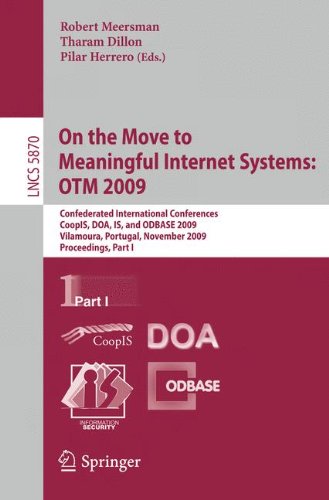

Most ebook files are in PDF format, so you can easily read them using various software such as Foxit Reader or directly on the Google Chrome browser.
Some ebook files are released by publishers in other formats such as .awz, .mobi, .epub, .fb2, etc. You may need to install specific software to read these formats on mobile/PC, such as Calibre.
Please read the tutorial at this link: https://ebookbell.com/faq
We offer FREE conversion to the popular formats you request; however, this may take some time. Therefore, right after payment, please email us, and we will try to provide the service as quickly as possible.
For some exceptional file formats or broken links (if any), please refrain from opening any disputes. Instead, email us first, and we will try to assist within a maximum of 6 hours.
EbookBell Team

4.3
98 reviewsThis two-volume set LNCS 5870/5871 constitutes the refereed proceedings of the four confederated international conferences on Cooperative Information Systems (CoopIS 2009), Distributed Objects and Applications (DOA 2009), Information Security (IS 2009), and Ontologies, Databases and Applications of Semantics (ODBASE 2009), held as OTM 2009 in Vilamoura, Portugal, in November 2009.
The 83 revised full papers presented together with 4 keynote talks were carefully reviewed and selected from a total of 234 submissions. Corresponding to the four OTM 2009 main conferences CoopIS, DOA, IS, and ODBASE the papers are organized in topical sections on workflow; process models; ontology challenges; network complexity; modeling cooperation; information complexity; infrastructure; information; aspect-oriented approaches for distributed middleware; distributed algorithms and communication protocols; distributed infrastructures for cluster and Grid computing; object-based, component-based, resource-oriented, event-oriented, and service-oriented middleware; peer-to-peer and centralized infrastructures; performance analysis of distributed computing systems; reliability, fault tolerance, quality of service, and real time support; self* properties in distributed middleware; software engineering for distributed middleware systems; security and privacy in a connected world; ubiquitous and pervasive computing; information systems security; privacy and authentication; security policies and verification; managing ontologies; using ontologies; event processing; dealing with heterogeneity; building knowledge bases; and XML and XML schema.